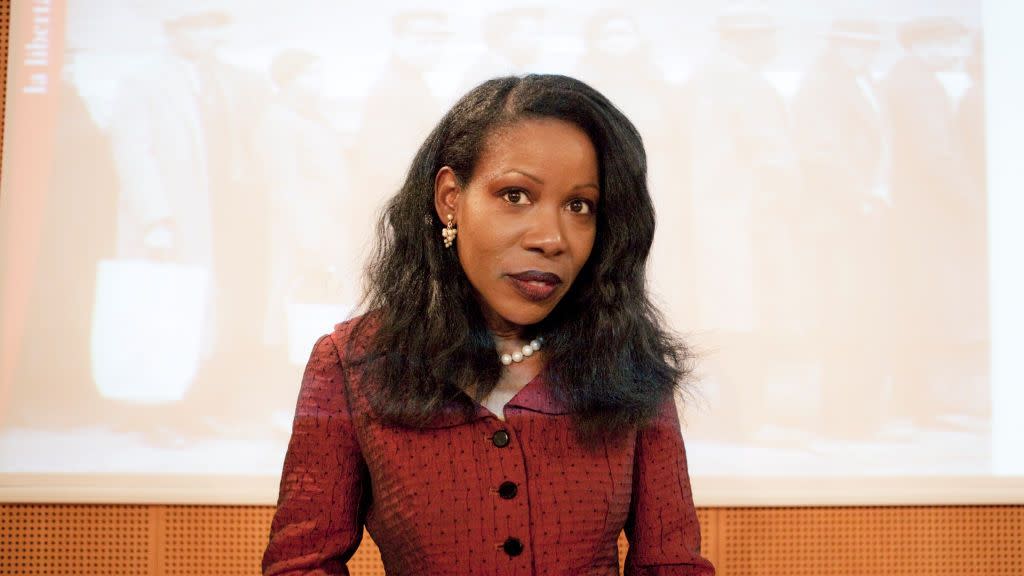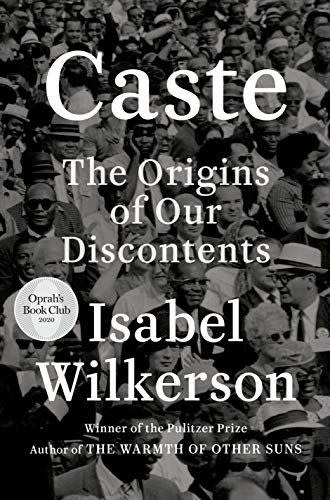“My Book Was Banned”: This Oprah’s Book Club Author Tells Us the Full Story

- Oops!Something went wrong.Please try again later.
"Hearst Magazines and Yahoo may earn commission or revenue on some items through these links."
It’s been three years since Caste, by Isabel Wilkerson, was published, and in the intervening years, political, cultural, and racial divisions have intensified. According to a report by PEN America, from 2021 to 2022, more than 1,600 books were banned in school districts across the nation. The impact on children, the educational system, and culture will reverberate for years to come.
Oprah Daily spoke to Isabel Wilkerson about book bans, including that of Caste, which has been removed from some libraries. A film version of Caste, titled Origin and directed by Ava DuVernay, premiered at the Venice Film Festival last month.
How did you find out that your book was banned?
My name came up in social media when The Washington Post ran a piece last spring about a library system in Texas that shut down all its libraries, and when the libraries reopened, Caste had “mysteriously vanished.”
How did it make you feel? What did you do? Is there anything you can do?
I was saddened but not surprised. These bans only affirm the forewarnings in the book. We’re in a period of backlash and retrenchment, which the book attests to and foreshadows. The only thing I can do is to keep pressing forward in my work, knowing that we can’t run from history and that the truth will win out in the end.
Putting aside your own work, what do you think of the situation overall?
In writing Caste, I had to do a tremendous amount of research into India and Germany during the Nazi era. The Nazis studied the United States’ Jim Crow laws in creating the Nuremberg laws. We are coming perilously close to the spirit of what they were doing in another century with the banning of books. It’s revisiting a past that we should never want to experience again.
This is coming at the worst possible time for us as a nation. We have an existential crisis in our demographics, politics, policing, and women’s reproductive rights. We’re a country on parallel tracks, and from responses to my books (The Warmth of Other Suns and Caste), I can see that some people are hungry and thirsty to understand the history of how we got here and what we can do. Then you have another segment that’s closing the door as quickly as others are pushing it open. It becomes yet another symbol of how deeply divided we remain and how these enduring divisions have managed to intrude upon us in this century. As we’re looking back at previous centuries to understand this one, we are, at the same time, replicating much of what we thought was in the past.
Is there anything—anything at all—that can be seen as positive?
As someone whose book has shown up on some of these banned-books lists, I would say that as a writer who obviously works hard to create this work, every book on some level is a labor of love, so it sometimes can feel personal. However, it brings more attention to the necessity of reading and knowing our history. In an odd kind of way, it elevates those books that it seeks to hide.
What do you wish you could tell the parents who want the books banned, and those who’ve been fighting to keep books on shelves?
To those who want to ban books, I would say, as most parents know, the best way to get a child to do something is to tell them they can’t do it.
To those fighting the ban, I would say they have a tremendous amount of power and influence in this crisis because many of the book bans are originating with parents. That means parents who believe in the value and necessity of books and knowledge, who want their children to know history and all its perspectives, who are in the majority, must stand up. We may be reluctant participants in a debate we didn’t want to be in, but this is the time to resist.
I open Caste with a description of a photograph taken in Germany shortly after the Nazis came to power. It’s a scene outside a shipyard where hundreds of people are standing, arms raised in the Nazi salute. There’s one man with arms crossed, not participating. I ask, what would it take to be that man in previous eras, and what would it take to be that man now? Some people will read that and be inspired and emboldened. There might be others who look upon it as something of an abstraction because those extremes, in our view, are not the same at all. But the essential question is still eternal, which is, how do you respond when you may be one of only a few people who can see what others cannot? It requires tremendous fortitude and conviction about what is right and what is best for humanity. Everyone is called upon to stand for what they believe in at a time like this. If we don’t stand up now, then we will have an even harder time resisting whatever else may be coming.

Caste (Oprah's Book Club): The Origins of Our Discontents
amazon.com
What is the lesson here?
We cannot escape our history; it is with us whether we recognize it or not. Our inheritance is like a preexisting condition. You can pretend diabetes or alcoholism doesn’t run in the family, but at some point, you will have to deal with it. You must deal with the consequences of history whether you acknowledge them or not. It’s like covering your ears, not wanting to hear what makes you uncomfortable, what threatens you or your place in society—that’s how I look at it.
I’m really struck by how the extremes are testing the limits of a supposedly free society. Many of us are just aghast, for example, that Florida is considering monitoring teenage girls’ menstrual periods. That’s a dystopian level of authoritarianism which is hard to fathom, and yet it is happening. It builds slowly and barely perceptibly, and if you’re not attuned to what is going on and you don’t act soon enough, then it’s so much harder to rectify something once it’s already on its path. Each critical situation that creates this standoff is a test of what we believe in and our awareness of what can happen. History is essentially a cautionary tale for humanity. The reason I’m such an advocate for history is that you can’t solve what you can’t see, and you can’t fix what you haven’t identified.
What does the future hold?
The demographics are on a course of change by 2045 to a configuration no one alive has ever seen, in which the historic majority will be in the minority. Some of what we’re seeing in book bannings is a response to that, or it’s preliminary tremors in advance of a major change. This is not the time to know less about our country but to know more. That means every decision, every single thing that we do, could set the stage for what kind of country this ultimately becomes.
Caste came out in hardcover just weeks after George Floyd, and now the paperback is coming out just weeks after Tyre Nichols; they’re like bookends to our culture. People often say that we are making progress. Yes, in some ways, there is progress, but what have we learned? How far have we come? These are the enduring questions because we seem to be going in a circle. All of this goes back to the divisions and hierarchy we’ve inherited as a nation. Closing ourselves off to information and history is not the solution. We need to overcome our divisions by opening up, not shutting down, discussion.
Isabel Wilkerson won the Pulitzer Prize for Feature Writing in 1994, as Chicago bureau chief of The New York Times, making her the first African American woman to win a Pulitzer Prize in journalism. Her debut work, The Warmth of Other Suns, won several awards, including the National Book Critics Circle Award and the Anisfield-Wolf Award for Nonfiction, and was shortlisted for both the Pen-Galbraith Literary Award and the Dayton Literary Peace Prize. Her latest work, Caste: The Origins of Our Discontents, is a national bestseller and the 86th Oprah’s Book Club pick.
You Might Also Like

